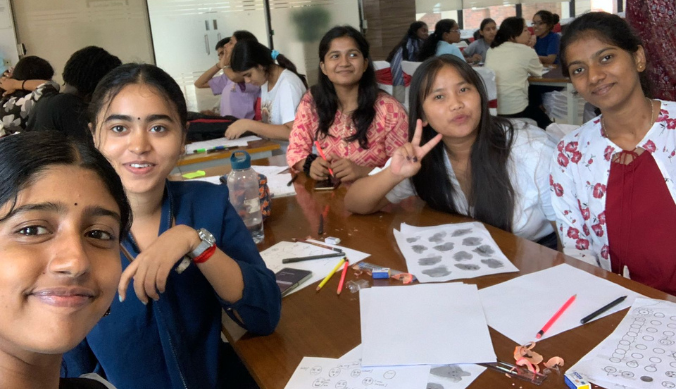Ashoka University’s Living Lab: LiveGreen@Ashoka Leading the Way in Circular Economy Innovations
The initiative empowers the Ashoka community to adopt green technologies, implement behavioural changes, and actively participate in operational interventions that promote sustainability
In the global pursuit of sustainability, academic institutions are transforming profoundly—redefining their role as dynamic hubs of innovation. The imperative for circular economy innovations is underscored by the Ellen MacArthur Foundation’s report, presenting compelling scientific data that accentuates the pressing need for change on a global scale. The report highlights that transitioning to a circular economy by 2030 can yield a net economic benefit of $4.5 trillion and promises substantial reductions in carbon emissions and waste. In this landscape of urgency, academic institutions, with their wealth of resources and diverse communities, are positioned to become living labs for sustainability initiatives. Ashoka University stands at the forefront of this movement with LiveGreen@Ashoka—a university-wide sustainability endeavour led by students and staff. It is a tangible manifestation of the university’s commitment to transforming its campus into a living lab for circular economy innovations and sustainable practices, serving as a model for other academic institutions.
With the support of Professors Gautam Menon and L.S. Shashidhara, I launched LiveGreen@Ashoka under the Centre for Climate Change and Sustainability as a student-focused initiative aimed at improving sustainability on campus. The initiative’s mission was to create a strong connection within the Ashoka community and inspire everyone to adopt sustainable choices on campus. It envisioned a campus where every action contributed to a greener and more sustainable future, nurturing sustainability from within. It all began with analysing activities related to Sustainable Development Goals (SDGs) and sustainability, speaking to student societies and clubs identifying interest areas, challenges and redundancy in projects across different student societies. Recognising the gaps, I emphasised the importance of students taking charge and collaborating with staff, societies, and clubs on various sustainability and SDG projects. Our commitment to inclusivity supports bottom-up initiatives and cross-departmental collaboration, promoting sustainability practices, raising awareness, and encouraging meaningful behavioural changes within the Ashoka community.

The three-pronged approach of LiveGreen@Ashoka integrates green technology interventions, behavioural changes, and operational interventions, making sustainability a tangible and integral part of campus life. The initiative empowers the Ashoka community to adopt green technologies, implement behavioural changes, and actively participate in operational interventions that promote sustainability.
Beyond being a mere vision, LiveGreen@Ashoka is a dynamic movement that leads by example. Initiatives such as the Green Agneepath Plastic Collection Drive, conducted in collaboration with Blue Nudge, Blue Planet’s initiative, and the Environment Ministry, address the pervasive issue of plastic waste generated during events like sports fests. Student volunteers play a pivotal role in transforming events into collective responsibility campaigns by collecting, segregating, and upcycling plastic waste into benches for students.
As part of LiveGreen@Ashoka, students can speak up and implement their ideas on campus. Throughout the past year, the program has collaborated actively with societies and passionate individuals on various projects. An example of such a project is the proposal of a vendor to recycle menstrual waste-Padcare, to handle menstrual waste at Ashoka, by our student Aishwarya Sunnad. As a result, Padcare facilities have been established throughout campus thanks to the collaborative support of the university administration and operations team. Another impactful initiative, the E-Waste Campaign, in collaboration with Tarang (Environment Ministry) and Attero, showcases the university’s commitment to the responsible disposal of electronic waste. Besides contributing to a greener mining sector, the campaign aligns with global efforts to reduce import dependency and create sustainable supply chains through expert presentations.
LiveGreen@Ashoka collaborates extensively with the AU SDG Club on projects such as LiveGreen@Ashoka Idea Box, Thrift Your Bags, and the Do You Know This About Ashoka series.

These initiatives engage students and staff in creating awareness about existing sustainability features, sharing ideas for enhancing sustainability efforts and repurposing resources—a testament to the collective commitment to responsible practices.
A recent initiative with the AU SDG Club involves transforming Ashoka’s paper waste into a student-led and run recycled stationery brand. This ambitious project minimises paper waste and reinvests proceeds into other sustainability-related initiatives, establishing a circular economy model within the campus. The project kickstarted with students painting waste cardboard boxes, later distributed in offices and resident halls across campus. The Digital Carbon Footprint Series, another brainchild of LiveGreen@Ashoka, addresses the often-overlooked aspect of carbon emissions in the age of rapid digital expansion. In collaboration with the Environment Ministry, the series sheds light on the environmental consequences of daily digital activities, empowering the community to make conscious choices and take sustainable actions in the digital realm.
In a significant addition to the sustainability narrative, LiveGreen@Ashoka proudly launched the first biodiversity guide on Ashoka University’s webpage, titled Fauna in and around Ashoka University. Crafted by the talented student Ishan Shanavas, this comprehensive guide consolidates information on diverse bird, mammal, reptile, and amphibian species that call our campus home.
Sustainability Skill Development takes centre stage with Ecocareers and Beyond: A Sustainability Workshop, hosted by LiveGreen@Ashoka for graduate participants. The programme prioritises active engagement, interactive learning, and real-world application, fostering active problem solvers and change agents. The workshop delves into Sustainability Education, Green Employment, and Green Entrepreneurship, culminating in a Sustainability Challenge and a reflective conclusion.
Through LiveGreen@Ashoka, Ashoka University is now a member of the Nature Positive University Network—collaborating with the University of Oxford and the UN Decade on Ecosystem Restoration. This alliance cements the university’s dedication to reducing carbon footprints, promoting biodiversity conservation, and integrating sustainability across all facets of university life. By joining the Nature Positive University Network, Ashoka University commits to reducing its carbon footprint, promoting biodiversity conservation, incorporating sustainable practices, and engaging in education and outreach. The university pledges to assess its biodiversity baseline and plan and carry out bold actions for nature using the Conservation Hierarchy or 4Rs – Refrain, Reduce, Restore, Renew. As proud members of the Nature Positive University Network, Ashoka University embarks on the journey towards becoming a nature-positive campus through the university-wide LiveGreen@Ashoka initiative, seeking support from the Ashokan community to take this journey forward.
The success of LiveGreen@Ashoka lies heavily upon the unwavering commitment of our student volunteers. They have dedicated countless hours towards implementing sustainable practices and raising awareness. Their enthusiasm and dedication serve as an inspiration to the entire Ashokan community.
Looking ahead, the narrative of LiveGreen@Ashoka is a testament to the power of collective effort in shaping a sustainable and circular future. From plastic collection drives to e-waste campaigns, the journey exemplifies how a university can lead by example and inspire global change. Going ahead, we look forward to collaboration from all Ashokans to host the very first sustainability expo, which provides students, clubs, and organisations from the Delhi-NCR region a platform to showcase their projects and initiatives in line with the SDGs. As the Living Lab continues to unfold, Ashoka University’s commitment to circular economy innovations stands as a beacon, illuminating a path towards a greener and more sustainable tomorrow.
Study at Ashoka













